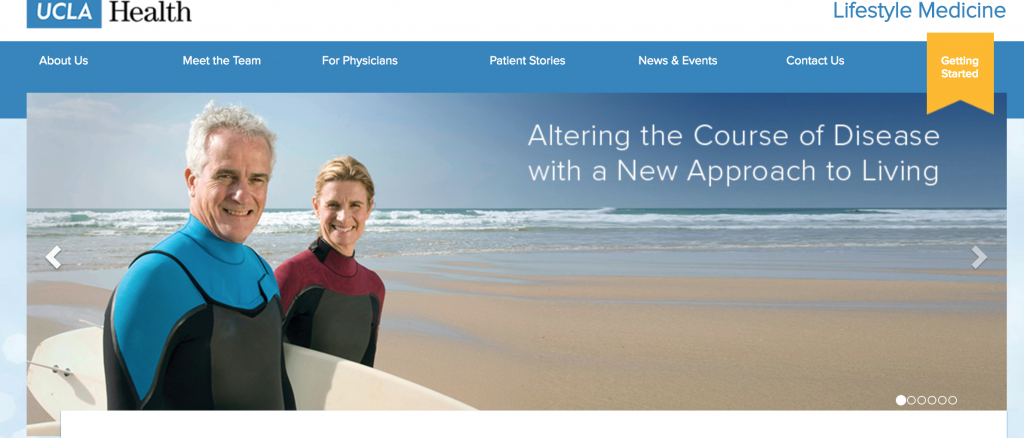
Can I Drink Coffee on the Ornish Program?
Are you one of the 87% of Americans who reach for a morning cup of joe or tea to jump-start your day?
Coffee, after water, is the most widely consumed beverage in the world, and it is the primary source of caffeine among adults. Tea comes in a close second.
Coffee and tea are considered the largest sources of antioxidants worldwide.
Coffee and tea are considered the largest sources of antioxidants worldwide, and there is significant research revealing their health benefits. Both coffee and tea have a myriad of bioactive substances such as polyphenols, chlorogenic acids, quinides, lignans, and trigonelline that protect against disease. Polyphenols, for example, play an important role in the prevention of degenerative diseases, particularly cardiovascular diseases, diabetes, and cancers.
Coffee shares similar protective benefits as cocoa and green tea due to the high concentration of polyphenols. (See Ornish Living articles: Why Cocoa is Good for Your Heart and Green Tea: Good for Your Heart and Brain)
A 2001 study of coffee and other caffeinated substances by scientists at the Nestle Research Institute that was published in the Journal of Agriculture and Food Chemistry showed that it has even more antioxidant potential than green tea. Yet a 2014 study by chemists in at the University of Belgrade published in RCS Advances that examined the protective effects of polyphenols on cancer, found that coffee comes in second to green tea.
All these substances together not only have an antioxidant effect, but they also have been shown in some studies to inhibit growth of tumor cells and hinder disease-causing bacteria.
The majority of evidence on the protective benefits of coffee for cardiovascular disease, stroke, hypertension, type 2 diabetes, and certain cancers comes from epidemiological research. Randomized controlled trials have studied the effects of caffeine and coffee on cardiovascular disease and risk factors such as blood pressure, cholesterol, and blood glucose/insulin sensitivity. The overall consensus of studies show a neutral or inverse association between moderate coffee consumption and cardiovascular disease and risk factors such as blood pressure. A meta-analysis examining the effect of coffee consumption on serum cholesterol concentrations concluded that the dose-dependent increase in serum total and LDL-C concentrations was greater for unfiltered than filtered coffee, whereas the consumption of filtered coffee resulted in very little change in serum cholesterol.
The Science Behind the Buzz
Caffeine is a naturally occurring substance found in plants such as coffee beans, tea leaves, kola nuts, guarana, and cacao pods. The most common caffeine consumption is from coffee, black tea, soda, chocolate, and maté. Caffeine can also be synthetically manufactured and added to drinks, food, sports-performance products, and medications.
Caffeine impacts our body by exciting the central nervous system, triggering a cascade of reactions that prompt the fight or flight response. Heart rate and blood pressure increase, blood flow is shunted away from the stomach for digestion to muscles for action, and gastric secretions increase, which may trigger heartburn and reflux in some individuals. Stress hormones such as cortisol are released to initiate action and alertness.
When this fight or flight response is chronically activated with regular caffeine consumption, our system can burn out, which in turn affects our adrenal glands by making their receptors less effective. This response causes our bodies to demand higher levels of caffeine to produce the same effect of alertness, energy, and pleasure. Just 100 mg a day can lead to physical dependence and cause withdrawal in its absence. Once you develop a tolerance, caffeine can be habit forming. Many of us are too familiar with the effects of stopping caffeine for even a day. Withdrawal symptoms include headaches, difficulty with concentration and sleep, and muscle pain in the stomach and joints.
Caffeine and Your Heart Health
The 2015 Dietary Guidelines Advisory Committee has concluded that strong and consistent evidence shows that moderate coffee consumption (3 to 5 cups/d or up to 400 mg/d caffeine) is not associated with increased risk of major chronic diseases, such as cardiovascular disease. Their scientific report says that moderate coffee consumption, along with other positive health behaviors, can be incorporated into a healthy lifestyle. The American Heart Association has also confirmed that drinking one to two cups of coffee per day does not appear to be harmful.
Caffeine and Cognitive Health
There is also building evidence that caffeine has a positive impact on cognitive health. A 2010 study published in the Journal of Alzheimer’s Disease demonstrated the protective effects of caffeine on neurodegenerative diseases such as Parkinson’s, Alzheimer’s, and dementia. Another study by researchers at the University of South Florida, also published in the Journal of Alzheimer’s Disease showed that high levels of caffeine in the blood were connected to slowing down the progression of dementia.
Caffeine Sensitivity: It’s Individual
Your tolerance to caffeine is affected by a variety of factors. These include a person’s genetics, age, body mass, and whether you have certain health conditions. Your tolerance levels can also increase with regular consumption, meaning it will take larger amounts of caffeine to produce its stimulant effects.
Genetics play a significant role in the risks and benefits of consuming caffeine. The effects of caffeine can vary depending on your sensitivity. If you’re a “slow metabolizer,” you may have greater risk of side effects such as a fast heartbeat, restlessness, anxiety, and sleep disturbances. The reason for this is that our genetic makeup determines the activity of a specific enzyme called CYP1A2, which is important for the metabolism of caffeine.
CYP1A2 enzyme doesn’t work adequately in some people (CYP1A2 genotype), and therefore slows down the metabolism of caffeine, rendering them more sensitive to the effects of caffeine. “Slow metabolizers” of caffeine (CYP1A2 genotype) may have a higher risk of heart-related side effects from caffeine such as high blood pressure and risk of acute non-fatal myocardial infarction (MI). “Slow metabolizers” of caffeine (CYP1A2 genotype) should avoid caffeine.
Resources for Testing Genetic Markers
Resources for genetic testing are listed below. Genetic testing is not necessary; however, there are tests on the market to detect the genetic susceptibility. Most people can easily identify if they are sensitive to caffeine by their side effects after having even a small amount of caffeine. If you notice you are sensitive, it is best to avoid caffeine.
Finding Balance Without Stimulants
The Ornish Lifestyle Medicine program encourages reducing your exposure to stimulants (both physical and mental) to create a more balanced and mindful way of living. The four-element approach provides the nourishment your body truly needs. This includes low-fat, nutrient-dense, whole-food, plant-based nutrition, regular exercise with natural stress management practices such as mediation and restorative yoga, and a base for developing healthy relationships and support. When you are well nourished with a healthy lifestyle, you don’t need to rely on stimulants for a quick fix. Instead you experience a state of balance with sustainable energy that promotes lasting vitality. You’ll have a longer “fuse” even in the midst of stress.
The whole-food, low-fat, plant-based lifestyle approach of Ornish Lifestyle Medicine eliminates many factors that deplete our energy such as simple and refined carbohydrates, processed foods, high-fat foods, and meat (think of how tired you are after a large high-fat meal such as Thanksgiving, a steak dinner, or a processed, high-fat lunch). Other lifestyle factors such as stress, isolation and a sedentary lifestyle also rob us of our energy.
Up to One Cup of Joe or Tea
The Dr. Dean Ornish Program for Reversing Heart Disease now allows for limited amounts of caffeine with the choice of up to one cup of coffee (or two cups of decaf, or one ounce of espresso). This includes those who are currently drinking coffee, are not sensitive to caffeine, and have a history of tolerating caffeine well. This inclusion of a limited amount of caffeine also includes the option for up to two cups of green or black tea. Green tea is the preferred choice since it has the highest concentration of polyphenols, and has a positive impact on cardiovascular disease.
When You Should Avoid Caffeine
Caffeine should be avoided if you’re sensitive to caffeine, have a history of high blood pressure, anxiety, or arrhythmias, insomnia, gastro-esophageal reflux, if you’re taking certain medications, and if indicated by your physician. It is important to discuss caffeine intake with your physician.
If you enjoy the roasted mocha flavor of coffee, but want to avoid the caffeine, there are many great-tasting alternatives such as Kaffree Roma, Pero, Naturalis INKA and Teeccino. These caffeine-free coffee alternatives are often made from ingredients such as chicory root, whole grains such as roasted barley or rye, herbs, and fruits such as beets and figs.
What has been your experience with eliminating caffeine?








